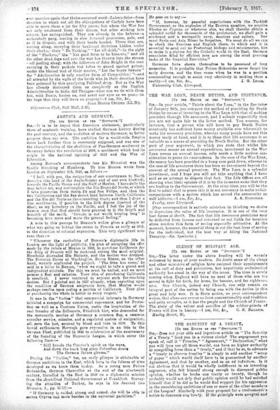AMERICA AND GERMANY,
(To FEE ED/TOE Or TES " SPFCTATOE."1
Sra,--It is to be hoped that American statesmen, particularly those of academic training, have studied German Watery during the past century, and the evolution of modern Germany, to better purpose than our own. The ambition for a world-wide Empire dates back further than is commonly supposed, and was one of the characteristics of the ebullition of Pan-German sentiment in Germany before the revolution of 1848, a sentiment whioh bad its origin in the national uprising of 1813 and the War of Liberation.
Among Bunsen's correspondents (see his Memoirs) was the Syndic Sieveking of Hamburg. To him Bunsen wrote from London on September 8th, 1846, as follows:— " I hail, with yon, the emigration of our countrymen to North America (the land of the Anglo-Saxons and of our own kindred), towards the Pacific Ocean and the Gulf of Mexico. I have daily the map before me, and contemplate the Rio Bravo del Norte, of which I take possession from Santa P4 and San Felipe, and then the two Californias and the fine desert land between North California and the Rio del Norte as the connecting tract; and then I draw a line southwards, if possible to the 25th degree (instead of the and), as my boundary on the Pacific, and I feel the joy of the human race that God should have granted to it the length and breadth of the earth. Canada is not worth keeping long' is becoming hero more and more the general feeling."
A note to this passage by Bunsen's widow gives a glimpse of what was going on behind the scenes in Prussia as early as 1842, in the direction of colonial expansion. This very el,gnificant note runs thus:-
" Whenever the curiosities of Bunsen's diplomatic life in London see the light of publicity, his plan of accepting the offer made by the rulers of Mexico in 1842, to purchase California for the King of Prussia will be reckoned among the most original. Humboldt dissuaded His Majesty, end the Matter was dropped. The Prussian Envoy at Washington, Baron Ronne, on the other hand, warmly applauded the project. ` The time has come,' he said in a letter to Bunsen, 'when we ought to take a grand and independent attitude. For this we must be united, and we must possess a fleet and colonies. Your idea of purchasing California is excellent. I never ventured to express such far-reaching desires. But I pointed out in 1837 already, when reporting upon the condition of German emigrants here, that Mexico would perhaps resolve upon ceding a portion of California. Your plan of purchasing the whole is better in every respect."'- It was in the "forties" that commercial interests in Germany initiated a eampaign for commercial supremacy, and for Protec- tion as well as a Customs Union, under the inspiration of the real founder of the Zollverein, Friedrich List, who demanded for the mercantile marine of Germany a common flag, a common consular service, colonies, and a regulated system of emigration; all, save the last, secured by blood and iron in 1870. To this• fervid enthusiasm Herwegh gave expression in an Ode to the. German Fleet, published in 1841 hi celebration of the anniversary of the founding of the Hanseatic League, in which occur the following lines tee " Still broods the Creator's spirit on the wave, And down the track long since Columbus dravo The German future gleams."
During the "forties," too, an early glimpse is obtainable of German ambitions in the East, which have in the fulness of time developed as we know them to-day. As a young man Prince ilehenlohe, German Chancellor at the end of the nineteenth century, travelled in the East in 1849 on a diplomatic mission from the short-lived National Government at Frankfort. Survey- ing the situation of Turkey, he says in his. Journal (see Memoir:, I., pp. 52.53) :— " If Germany is unified, strong and armed, she will be able to secure Gnome and more besides in• the universal partition." He goes on to say :- " If, however, by peaceful negotiations with the Turkish Government, or the explosion of the Eastern question, we acquire Rhodes or Cyprus, or whatever else, we shall thereby obtain a splendid outlet for theiwands of the proletariat, we shall gain a sea-board and a mercantile navy, marines and sailors. Nor must Syria and Asia Minor be forgotten. We must do all we can to cheek the Russians and English there, to which end it is essential to send out no Protestant bishops and missionaries, but to make it a station for the Catholic world in the East. German consulates filled by efficient men are among the most pressing tasks of the Imperial Executive."
Germans have shown themselves to be possessed of long memories. It is probable that Prince Hohenlohe never forgot his early dreams, and the time came when he was in. a position commanding enough to assist very effectively in making them a






































 Previous page
Previous page